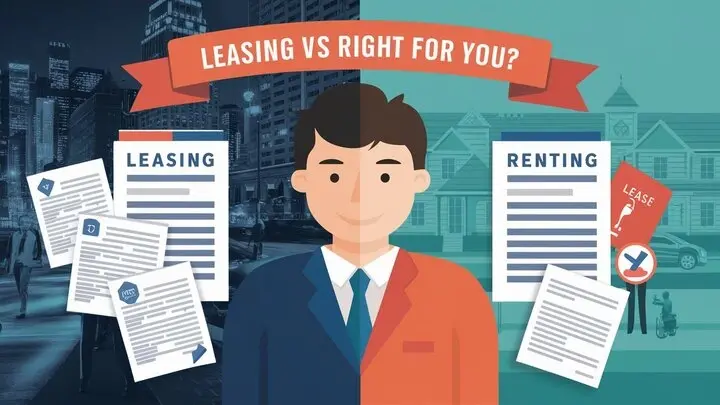
Leasing and renting are two terms that may be used to mean the same thing in some contexts, but they have significant distinctions in other contexts.
When searching for a place to live, the argument arises between renting and leasing and what is the difference. These may appear synonymous but there are distinctions between renting and leasing that you need to know before choosing the option to go for. The knowledge of these differences may assist one to decide on which among the given choices is preferable from the financial aspect.
What is Renting?
Leasing means entering into an understanding with another person that lets the latter take possession and utilize property belonging to the former with regular payments made to the owner usually every month. Renting entails a process where one party- the landlord or the lessor- agrees to lease a property to another party- the renter or the tenant. Some of the typical property categories concerning renting include apartments, single houses, and condominiums.
The renter is expected to pay a certain amount of rent to the landlord determined at the time of letting the premises. This usually includes periodic payments often made for the use of the property without taking possession of it or having a stake. The rental contracts that are involved in the lease type are often for shorter durations of time as are the monthly or annual rental periods. While renters can buy a few things in the property, leaving them with no equity, they are also required to pay all utility expenses on top of rent.
The main advantage of renting is that the agreements tend to take a shorter time compared to buying. However, rents usually go up every year, so the long-term costs are not as predictable as they would be when leasing a property. Tenants also are often deprived of the right to modify the rented house or apartment by changing its structure significantly. A common practice in most rentals is the security deposit, which can be a partial or full amount charged upon signing the lease agreement and may be returned when the tenant vacates the premises.
What is Leasing?
Leasing also helps a person to use a property which he or she has no ownership right over at any given period. Although there are differences in meaning between rent and lease, there are several major differences between renting and leasing. The key objects that are leased are cars; machinery, and equipment; and buildings or lands.
In a lease agreement, the party that enjoys the benefits of the underlying asset is referred to as the lessee. Lessor is the one who owns the asset which is leased out to another person for its use. Similar to renting, the user pays a certain amount of money over and over again to use the asset and does not own the asset or have any equity in it. However, lease terms are usually longer than other rental agreements, typically for real estate contracts that range from 2-5 years, and for automobiles, contracts range from 2-6 years.
Leasing generally entails far greater initial costs but a more stable later cost in the form of monthly lease payments as opposed to rent. In the case of real estate, a long-term lease may specify that the annual rent can only be increased up to a certain level and therefore gives better cost control. Generally, the owner of the leasehold can carry out more alterations than the owner of a rental property due to the laws on allowed modification. If the lessee incurs these costs relating to improvement then they may be entitled to certain allowances or allowed to take out those improvements upon surrender of premises. However, any significant alterations are permitted only under the endorsement of the lessor.
Renting vs Leasing – Main Distinctions
While renting and leasing may seem similar initially, the following key differences distinguish these two arrangements:
Lease Terms – While lease contracts may offer shorter rental periods than rental agreements, fixed terms of lease agreements are longer than rental agreements, but month-to-month leasing is also available. Typical rental agreements are indeed limited and can only be for a short term, for instance, the renting of houses on a month-to-month basis or even one-year leases.
Cost Certainty – Due to the long-term nature of the lease they come with provisions for the maximum allowable increase in rent in a year thereby providing a measure of predictability in housing costs. Rent costs may increase annually in line with market trends, and provide fewer guaranteed rates.
Initial Costs – Leasing may demand higher initial charges like security deposit, initial month’s rent, bank charges, etc., while rent payments require initial charges being only the first month’s rent to move in.
Customization allowance Leasing provisions also provide additional opportunities for tenants to make modifications on the leased premises where there are certain credit or reimbursement rights. Tenants can often only refrain from making changes, which can be a problem.
Equity - As the payments are made the renters and lessees do not have any claim over the asset since they are merely paying for the rights to use the asset and not own it. The tenant or occupant only has the use during the occupied period, the landlord or lessor retains ownership.
Hence, we attempt to answer the question: Which is the better option?
Generally, the two appear to be on par on many of the factors taken into consideration but whether leasing is preferable to renting depends on many factors. Here are some key considerations as you decide between the two when searching for a place to live:
- This is perhaps one of the most important questions that is asked as follows; Shorter terms could do well with renting since it’s a more fluid form of housing arrangement while longer terms may do well with leasing as it’s a more stable form of housing arrangement.
- If yes, which of the following is more important to you: having longer periods of cost predictability or higher levels of cost predictability over the short term? Leasing has more levers of legal shields against sudden rent boosts.
- Are you willing and able to spend more initially for your products and services? First/last month’s rent and security deposit are frequent demands while signing a lease agreement.
- Are you looking for ways to make changes to the appearance of your home or office? Leasing also allows for more freedom to make improvements and changes on the property.
- You may be wondering whether you are comfortable with the idea of losing money monthly. Leasing may mean no built equity if the cost of apartments increases in the long run.
Consider the individual circumstances and forecast your needs for the immediate future and farther away. Although renting is more flexible in terms of moving and changing locations, leasing is superior since it comes with more consistent and affordable prices while also permitting more modifications to the property. By taking into careful consideration all the differences it becomes easier to make a proper decision on whether leasing or renting fits the situation best.



